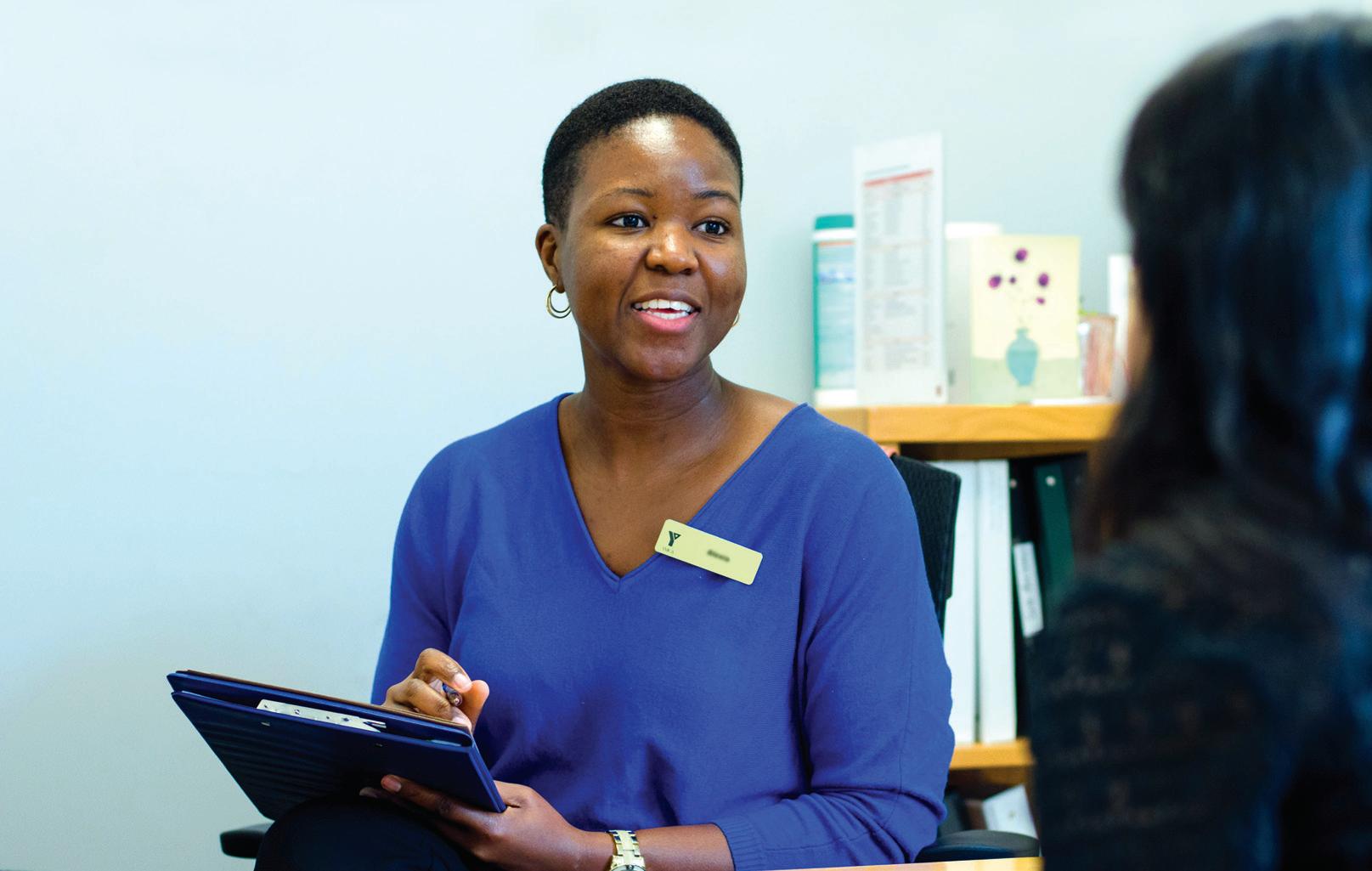
19 minute read
COVER STORY
CHANGEMAKERS Our seventh annual ‘Immigrant Women of Inspiration’ special shines the spotlight on women who are Changemakers – leading voices who have served and continue to serve as an inspiration in so many different fields.
We have picked five women from different backgrounds, countries of origin and generations whose voices are inspiring others and making a positive impact. Some have been here for decades, and others have made Canada home just a few years ago. These are their inspiring journeys.
Here are the stories of Muzna Dureid, Alma Arzate, Laura Mannix, Lata Pada and Nelly Gong.
Muzna Dureid was born in Syria to an activist family. When Dureid was 16, Iraqi refugees flooded Syria seeking shelter from the ongoing war in Iraq. This is when she first realized her deep compassion for and endless inner power to help the less fortunate in any way possible.
By the time Dureid was 19, her family became one of millions of Syrian refugees fleeing the war, seeking shelter in France, Saudi Arabia, and then Turkey.
While living in Istanbul, Turkey as a human rights activist, Dureid was invited by the Nobel Women’s Initiative to come intern in Ottawa. Though she knew no one in Canada, Dureid made her way here in 2016 and discovered a welcoming society, one that allowed her to grow and feel supported.
“I was in touch with a Canadian family in Montreal and they invited me to stay with them, considering my situation,” said Dureid. “So, I moved to Montreal and I applied for asylum there.” Soon after, Dureid decided Canada would be her new home.
This family eventually applied to privately sponsor the rest of Dureid’s family. They arrived in 2019, and are very proud of Dureid’s efforts and accomplishments.
Dureid works for The White Helmets, a humanitarian NGO that brings volunteers together to help people in war zones. “We have 5,000 people on our teams who help civilians all over Syria, giving them first aid and helping them... helping them to stay where they are and to be resiliant in facing all kinds of pressure and war,” said Dureid.
Through working with The White Helmets, Dureid gained further insight into the needs of women in conflict, as well as the need to inform people around the world about the situation in Syria and about refugees worldwide, in general. This aided her in coming up with ways to develop local focus groups in Canada and to provide information and generate support.
“We were nominated in 2016 for a Nobel Peace Prize, and we got
Muzna Dureid | Youth activist
an alternative nobel prize and we have two movies on Netflix – one of which won an Oscar,” said Dureid.
Dureid herself has also recieved awards for her work and, while they help fuel her passion and keep her going, she mainly hopes to inspire others to find a cause they can devote their heart and efforts to.
“I know we are all suffering from compassion fatigue, because there are so many causes and problems, not to mention the Coronavirus,” said Dureid. “It’s difficult for people to be involved and continue sometimes, because they feel like it’s so big and so far away.
“When I recived asylum, I felt survivor guilt. Why am I here and why do I get to have a safer place to stay, while my family is under seige in Syria and don’t even have drinking water? But, they told me that I can’t help others without being in a secure situation. And, my dad reminded me that when we fly in an airplane, they say we should put the oxygen mask on ourselves before helping our loved ones.”
Dureid went on to explain that once we are good and have our needed “oxygen” supply, it is then our turn to help others. And that is why she is devoting her life to helping others in any way she can.
Dureid has brought attention to how young girls are forced into marriage, working as the founder and coordinator of Women Refugees, Not Captives campaign, aiming to end forced child marriage in Syrian refugee camps. She is also the co-founder and board member of the Syrian Women’s Political Movement, the first to engage Syrian women in politics and peace talks.
Dureid is also the founder of the Indigenous-Refugees Movement that brings refugees and indigenous people together over shared backgrounds of abuse, stigma, and misinformation toward building stronger bonds in Canada through learning about truth and reconciliation. “When we have a human relationship, we can tackle any problem and we can start to find a solution,” says Dureid.
In 2019, Dureid received the Canadian Excellence in Global Women and Children’s Health Award in the Young Leader category, as well as the Canadian Association of Refugee Lawyers annual award for Outstanding Advocacy on behalf of the Human Rights of Refugees.
While continuing with her activism, Dureid will be heading to Concordia University next fall. “I’d like to be a leader and politican in the future here in Canada. I’m looking forward to continuing my work, to give back to Canada what I’ve received and what my family has also received,” she says. – Rebeca Kuropatwa
As a female in a male dominated industry, Alma Arzate says she struggled to discover her voice. “I was doing great on a oneon-one basis, but during meetings, I didn’t have the courage or know how to break into discussions to offer my perspective. When I did break in, sometimes one of my peers would just take what I had said, repackage my idea and get it accepted as if it came from him all along,” says Arzate.
Having a voice certainly doesn’t seem a problem now. Arzate has stood on stage as a speaker at numerous events and conferences including as keynote speaker at the Schulich School of Business, Master of Supply Chain Program in 2019 and continues to inspire others to find their voice.
While Arzate could have simply allowed her frustrations early on to get her down, instead she became an active learner. “I observed and learned how they presented these ideas so effectively,” she says. Gathering information before a meeting, making notes, speaking deliberately and in command of her emotions were just some of the techniques Arzate used to find her voice.
Arzate now finds herself in the position of facilitating the very meetings she once struggled to speak out in and uses her experience to help other women who may be facing similar challenges. “I try to make these meetings a safe environment for other women to speak, acknowledge their contributions, and invite them into the discussion if I sense they are hesitating to say something,” she says.
Arzate is originally from Ciudad Juarez, Mexico. She had a thriving career as a supply chain manager for Johnson & Johnson
Alma Arzate | Inspiring others to find their voice

CANADIANIMMIGRANT.CA | 9 back home, but as Juarez became a more dangerous place to live, she and her husband decided they wanted to raise their young family in Canada. “We felt we shared a lot of the same values and beliefs, and we admired the Government’s welcoming attitude towards immigration,” says Arzate.
Arzate relocated to Canada in 2007, settling in Markham, Ontario. Arzate made a conscious decision to step back in her career upon immigrating but soon began to climb the ladder. She was promoted to project manager in 2009, then senior manager, supply chain in 2011 followed by director, supply chain planning in 2012 at Apotex Inc., a generic pharmaceutical manufacturer in Toronto. She is now a global director, supply planning, leading a team of four managers and 24 supply chain professionals.
Arzate didn’t have any female industry leaders to look up to when she began in the industry. “The only role model I had at the time were my managers and other senior leaders and most were male,” she says. When she was promoted to manager, she was only one of four female managers in a group of 104 operations and supply chain managers.
Arzate then focused on the value she could bring as a woman. “Women are known to value relationships with others,” she says. “Bringing this trait into the workplace can result in engaged and productive cross-functional teams contributing to the bottom line of the company.” Being an empathetic listener, the ability to understand opposing viewpoints, enabling a collaborative environment for creativity and decision making are just some of the feminine traits Arzate says women bring into the workforce that have helped her to grow in her career.
Arzate is passionate about sharing her insights and lessons learned with students. She is an active supporter of the student body of the Rotman School of Management, Conestoga College and Wilfried Laurier University and has spoken at numerous student conferences. “This is an extremely rewarding way for me to give back to the profession, as I am helping pave the way for the future leaders that will eventually take our spots,” says Arzate.
In 2019, Arzate was selected by the Supply Chain Canada Association as part of their first ever 100 Influential Women in Canadian Supply Chain. “It was truly an unexpected honor,” she says. “To me, it served as a recognition for the challenging journey that brought me where I am today.” But most important, Arzate says she hopes the recognition serves as an inspiration to others.
“As I shared this honor in social media, internationally trained supply professionals that have made Canada their new home reached out to me to say that it gave them hope that if a fellow immigrant that came to Canada 13 years ago as a Project Manager could receive this honor, then they could believe they also have what it takes to achieve their goals and dreams.” – Lisa Evans

Using the term “changemaker” to describe Laura Mannix is fitting, but perhaps not quite adequate to describe her passion for influencing social change. The Australian-born Mannix is a young, vibrant leader who uses her leadership position in the immigrant settlement sector in B.C. to evolve how settlement services are offered.
“Being able to leverage change in systems to benefit the community and the livelihoods of those that are a part of it is what motivates me every day,” says Mannix, director of community development at DIVERSEcity Community Resources Society in Surrey, B.C.
What type of change is Mannix focused on? “To move settlement services to a place of community building and equity, centred on the experience of people who are actually in the system,” she says.
For Mannix, this vision is influenced by her own experiences as an Australian of mixed race.
“My mom and her family had to leave Egypt for religious and political reasons and went to Australia in late 1960s. Being a firstgeneration Australian of mixed race, I grew up seeing the dynamics of what it means to be a migrant in Australia,” she says, explaining that the legacy of the impact of the White Australia policy established Laura Mannix | Building communities
Looking to improve your English and /or French Language Skills?

Do you want to take Occupation Specific Language Training and Enhanced Language Training programs?
CLASSES ARE AVAILABLE AT NO COST: • Beginner to advanced levels • Full time or part time • In class, online and home study • Daytime, evenings & weekends
CALL US TODAY AT 416-925-5462 Find your nearest YMCA Language Assessment and Referral Centre at: ymcagta.org/language Downtown/Etobicoke/North-East/ North-West/Scarborough
START LEARNING WITH US THIS WINTER. GAIN NEW SKILLS. ADVANCE YOUR CAREER.






Explore the possibilities with Continuing Education at George Brown College
Fit learning into your life easily with our evening, weekend and online courses. Take advantage of our downtown Toronto campuses, or study from anywhere with our many distance learning options. Enjoy the flexibility of completing a program at your own pace.
CHOOSE FROM COURSES AND PROGRAMS IN Arts and Design Business and Legal Studies Communication and Languages Computers and Information Technology Construction and Trades Health Sciences and Community Services Hospitality and Culinary Arts Liberal Arts and Sciences Makeup and Esthetics
coned.georgebrown.ca
Register now for winter courses!
the racial inequity of the country.
“You had to assimilate; it wasn’t about integration. There was a lot of shame. There was a lot of trying to be as Australian as possible,” she says.
Her experiences led her to study human rights and international studies at university, and start a career in refugee services in Melbourne. “I didn’t want folks to feel the same way or go through the same hardships my family did. I thought there are ways to make this better.”
That’s her focus today at DIVERSEcity. After moving to Canada for love, Mannix experienced a whole new set of struggles as a skilled immigrant. She worked in retail, while volunteering, networking and sending emails to different immigrant-serving agencies in Metro Vancouver. DIVERSEcity was the agency that lucked out when it hired her to oversee its refugee and specialized programs in 2015, including its work with Operation Syrian Refugee.
That was five years ago and, in 2018, she moved up to the organization’s senior leadership team, overseeing all aspects of settlement services. “Moving up to this position has given me more access to policy and people with decision-making abilities, enabling a whole different level of change.”
But, with every change, Mannix ensures she creates space for immigrants, refugees and other marginalized populations to share their voices and lived experiences to inform the work being done.
“Newcomers should feel accepted, welcomed and like they have the same positioning in the community as their Canadianborn counterparts,” says Mannix, in contrast to her experiences in Australia. “Ultimately, we should all feel like we belong.” – Margaret Jetelina
When young Lata Pada moved from warm Mumbai, India to the small town of Thompson, Manitoba in 1964, nothing could have prepared her for the shock of the brisk prairie Canadian winter. She had moved with her husband, Vishnu Pada, a geologist by trade who got a job working for a mining company.
After five years, the couple transferred to Indonesia, working with the same mining company. Ten years later, they moved back to Canada. This time, to the mining town of Sudbury, Ontario.
And then, tragedy struck. On June 23, 1985, Pada lost her husband and their daughters, who were on board the Air India flight 182 that exploded mid-air due to a terrorist bomb while on their way to join Pada in India.
“After the Air India tragedy, I moved back to India for five years, because I had nothing to live for in Canada,” said Pada. “I had nothing else to turn to except my dance. I wanted to lose myself back into it, so that I could have something I could completely devote myself to...and to turn my mind away from the devastating grief and loss I was suffering.
In addition to starting up her company, Pada was also a vocal activist in getting the Canadian government to recognize the Air India bombing as a Canadian tragedy, a bombing that included the deaths of 268 Canadians. And, she worked to find ways to impact the community through her medium of choice – dance.
One of these projects involved working with abused women in her local East Indian community. “The project was called, ‘Dispelling Darkness,’ and was with the Ontario Arts Council through the Ministry of the Status of Women, using the arts to work with women who suffered from issues of partner violence, gender violence, and sexual violence...[around] how to nurture back their self-esteem and assist them in coming through the trauma they
Lata Pada | Making change through dance

may have experienced...[using] different workshops to generate their own poetry and develop their confidence level so they could perform it for the public,” said Pada.
Another project involved working with school kids to develop dance and drama skills that revolved around a theatre production. “It was about a young girl who immigrated from India and how she was undergoing bullying and being ostracized by her classmates, because of the way she dressed, or the kind of food she brought to school to eat, or the way she spoke...and how she was being shunned by the school,” said Pada.
Over the years, Pada has received many awards of recognition for her community contributions, including the Order of Canada and the Queen Elizabeth II Diamond Jubilee Medal in the general community, as well as the Mississauga Arts Council’s Lifetime Achievement Award and the Mississauga Legends Row Award in the local arts community, among others.
In 2011, Pada was the first performing artist to receive the Pravasi Bharatiya Samman Award from the President of India, recognizing her outstanding contributions to further dance, and for her activism into the inquiry about Air India flight 182.
Pada pushed for the recognition of Indian dance as a classical form of dance in Canada equal to ballet. “The classical form of dance we practice is a very deep, rich, and sophisticated art form that is as rigorous, developed, and sophisticated as ballet, with dancers trained over a long period of time of 12 to 15 years,” she said.
Lata is mostly definitely a changemaker. “I think it’s because of my efforts that they [the arts community] are now giving grants to various foundation artists who practice the many forms of Indian classical dance. So, I think that’s a change I’m very proud of being able to bring about.” – Rebeca Kuropatwa
Nelly Gong has faced her share of adversity. From living in a shelter with her young children to being diagnosed with leukemia, Gong has faced each and every challenge head on and as a result, has broken boundaries and set new records in the insurance industry.
Gong arrived in Toronto in 1997 as a skilled immigrant. Growing up in a family of teachers in China, Gong was a third-generation teacher there. She left her teaching position in China to attend the University of Maryland in the USA to complete her PhD. Four years later, she immigrated to Canada with her ex-husband and then 18-month old son in search of a better future for her young family.
But the road to success wasn’t paved with ease for Gong. Eighteen months after landing in Toronto, Gong was diagnosed with leukemia, a blood cancer for which she continues to receive treatment for even today. Shortly after her diagnosis, Gong left her marriage and the house she shared with her then husband and moved into a shelter for women.
Determined to get back on her own feet, Gong moved back into her own house a few months later and in the summer of 2002, established her own State Farm Insurance Agency in Mississauga, the first ever Chinese Insurance Agency for State Farm, becoming an entrepreneur for the first time in her life.
When she started the business, her oldest son was six years old and her youngest was one. The greatest challenge of being an entrepreneur and mother was finding time to balance work and being a mother. “I had to plan ahead and be smart,” she says. “I rented an online access card from Bell for my laptop so I could get some of my work done while waiting for my son at his swimming classes.”
Although she was still battling leukemia and raising her three young boys, Gong accepted a call from the United Way of Peel Region who invited her to join their board. “I accepted because I wanted to give back to the community who supported me when I was in need,” says Gong.
Gong has since worked with several community organizations including the United Way of Peel Region, Mississauga Mandarin Association, United Way Greater Toronto, Peel Region Police, Nelly Gong | Giving back to the community

Streetsville Rotary Club, and the Chinese English Toastmasters Club and been recognized for her work in the community and received awards including the City of Mississauga Civic Award of Recognition in 2009.
Gong helped to establish the United Way of Peel Region’s first-ever community advisory council, the Chinese Advisory Council. Later, Peel Police reached out to Gong and asked for her help to build their Chinese Advisory Committee. “I want to help them to understand our communities and also to bring the mainstream into our local different communities,” she says. Gong is now the Director of Community Service and President Elect of the Streetsville Rotary Club. In July 2020, she will become the President of the Club.
Being involved in community initiatives has not only helped Gong to grow personally, but professionally as well. “When you offer yourself to your community, you learn more from your community which really helped me build up my business,” she says. Giving back to the community has been a cornerstone of Gong’s business. “When you have the heart for your community, your community will lay their trust on you,” she says, adding that the majority of her new business comes strictly from referrals.
From her desire to help other newcomers in the industry, Gong purchased a desk for her office to host co-op students. “The best way to get to know your community and your professional field is to volunteer and get shadowed by the peers in your professional field,” she says. Gong has been a co-op employer for the Mississauga Newcomer Center, the University of Western Ontario, Sheridan College and University of Waterloo and has helped many newcomers find their first Canadian job through her clients and business connections. She encourages newcomers to learn and adapt to their new environments, always continue to learn and get on their own two feet as soon as they can. – Lisa Evans




